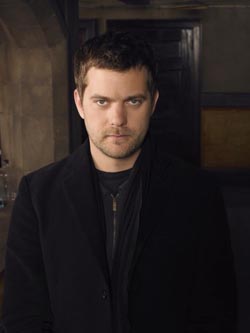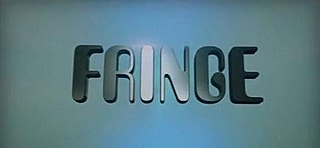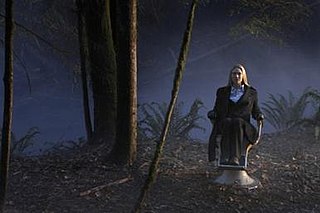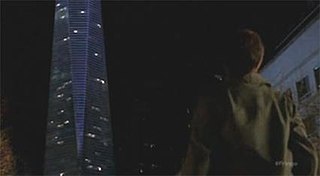
Fringe is an American science fiction television series created by J. J. Abrams, Alex Kurtzman, and Roberto Orci. It premiered on the Fox television network on September 9, 2008, and concluded on January 18, 2013, after five seasons comprising 100 episodes. An FBI agent, Olivia Dunham ; a genius but dysfunctional scientist, Walter Bishop ; and his son with a troubled past, Peter Bishop, are all members of a newly formed Fringe Division in the Federal Bureau of Investigation. Based in Boston, Massachusetts, the team uses fringe science to investigate a series of unexplained and often ghastly occurrences which are related to a parallel universe.

Olivia Dunham is a fictional character and the main protagonist from the science fiction television series Fringe, which aired on the Fox Broadcasting Company in the United States from 2008 to 2013. The character was created by series' co-creator J. J. Abrams, and is portrayed by actress Anna Torv. Olivia is the series' protagonist, and was introduced as an FBI Special Agent, working for a multi-agency task force of the U.S. Department of Homeland Security called the Fringe Division, dealing with supernatural events that are linked to experimental occurrences. Having grown up with an abusive stepfather, Olivia struggles with the unexpected changes in her life, following her encounter with mentally unstable scientist Walter Bishop, and his son and an eventual love interest for her, Peter Bishop.

Walter Harold Bishop, Ph.D. is a fictional character on the Fox television series Fringe. He is portrayed by John Noble. Noble also plays Walter's counterpart in the show's parallel universe, who is referred to in the show as Walternate.

Peter Bishop is a fictional character of the Fox television series Fringe. He is portrayed by Joshua Jackson.
"There's More Than One of Everything" is the finale of the first season of the American science fiction drama television series Fringe. The finale followed David Robert Jones' attempts to open a doorway to the parallel universe, while the Fringe team tries to stop him. It ends with FBI agent Olivia Dunham discovering a startling secret about Massive Dynamic founder William Bell.

The second season of the American science fiction television series Fringe commenced airing on the Fox network on September 17, 2009, and concluded on May 20, 2010. The season was produced by Bad Robot in association with Warner Bros. Television, and its showrunners were Jeff Pinkner and J. H. Wyman. Actors Anna Torv, John Noble, and Joshua Jackson reprised their roles as FBI agent Olivia Dunham and father-son duo Walter and Peter Bishop, respectively. Previous series regulars Lance Reddick, Jasika Nicole, Blair Brown, and Kirk Acevedo also returned, though with Acevedo in a limited capacity.

The third season of the American science fiction television series Fringe began airing on the Fox network on September 23, 2010, and concluded on May 6, 2011. Twenty-two episodes long, the season was produced by Bad Robot Productions in association with Warner Bros. Television, and its showrunners were Jeff Pinkner and J. H. Wyman. Lead actors Anna Torv, John Noble, and Joshua Jackson reprised their roles as FBI agent Olivia Dunham and the father-son duo Walter and Peter Bishop. Previous series regulars Lance Reddick, Jasika Nicole, and Blair Brown also returned, along with recurring guest stars Kirk Acevedo, Seth Gabel, and Ryan McDonald.

"Peter" is the 15th episode of the second season of the American science fiction drama television series Fringe, and the 36th episode overall.

"Jacksonville" is the 14th episode of the second season of the American science fiction drama television series Fringe, and the 35th episode overall. In the episode, Olivia is forced to recount her time spent as a child in tests conducted by Walter to regain the ability to see objects that have been influenced by the parallel universe and prevent the deaths of innocents. Though successful, Olivia comes to learn the truth about Peter, that he is from the parallel universe.
"Entrada" is the eighth episode of the third season of the American science fiction drama television series Fringe, and the 51st episode overall. The first part of the third season spent much of its time alternating between the prime and parallel universes, and "Entrada" was the first episode of the season to have time evenly divided between both. In the episode, both Olivia and her doppelganger "Fauxlivia" attempt to journey back to their respective universes. John Cassini, Seth Gabel, Ryan McDonald, Stefan Arngrim, and Karen Holness guest starred.

"Over There" is the two-part second season finale of the Fox science fiction drama series Fringe. They are the 21st and 22nd episodes of the season, and the 42nd and 43rd episodes of the series overall. Both parts were written by Academy Award-winning screenwriter Akiva Goldsman, together with showrunners Jeff Pinkner and J. H. Wyman. Goldsman also served as director, his first such credit since the season premiere.

"Olivia" is the first episode of the third season of the American science fiction television series Fringe. The episode was co-written by J. H. Wyman and Jeff Pinkner, and was directed by Joe Chappelle. The third season spent its time alternating between the prime and parallel universes, and "Olivia" was placed in the latter. This is indicated in the introduction of the episode, with the same red screen used in the last season's finale, "Over There". "Olivia" follows the cliffhanger left by the second season, in which Olivia Dunham is trapped in the parallel universe. The episode explores the consequences of Olivia's abduction by Walternate, and her attempt to go back to the prime universe.
Lincoln Lee is a fictional character on the Fox television series Fringe (2008–2013). Lincoln first appeared in the season two finale on May 13, 2010. He is portrayed by actor Seth Gabel.
"Subject 13" is the 15th episode of the third season of the American science fiction drama television series Fringe, and the 58th episode overall. Inspired by fan reaction to the show's previous flashback episode, "Peter", "Subject 13" occurs 25 years before the show's current timeline, in 1986 six months after "Peter". The episode, with scenes set in both the prime and the parallel universe, explores Walter and Elizabeth Bishop's attempts to return Peter to the parallel universe using the Cortexiphan-induced abilities of young Olivia Dunham, while Walternate in the parallel universe struggles to deal with the kidnapping of his son.

"Lysergic Acid Diethylamide" is the 19th episode of the third season of the American science fiction drama television series Fringe, and the 62nd episode overall. The narrative followed the Fringe team's attempts to extract William Bell from Olivia's brain by entering her mind with the help of LSD.

"6:02 AM EST" is the 20th episode of the third season of the American science fiction drama television series Fringe, and the 63rd episode overall. The narrative follows the activation of the doomsday device by the parallel universe, and the subsequent devastating consequences experienced by our world.

"The Last Sam Weiss" is the penultimate episode of the third season of the Fox science fiction television series Fringe, and the 64th episode overall. The storyline follows the continuing disintegration of the prime universe, as the Fringe team races to prevent the destruction of their world. FBI agent Olivia Dunham recruits Sam Weiss for help while Peter recovers from touching the doomsday machine in the previous episode.
Fringe is an American science fiction drama television series originally broadcast from 2008 to 2013. The show, created by J. J. Abrams, Alex Kurtzman, and Roberto Orci, revolves around the fictional Fringe Division, a congressionally funded federal law enforcement task force, staffed primarily by Federal Bureau of Investigation and Homeland Security personnel. The task force is responsible for investigating crimes and phenomena related to fringe science and the individuals and conspiratorial organizations that perpetrate those acts. During the five-season series, the mythology and backstory of the show expanded across a broad spectrum of recurring themes, locations, and characters to serialize story arcs and intricately link early episodes with later ones.

"Neither Here nor There" is the fourth season premiere of the Fox science fiction drama television series Fringe. The episode depicts the aftermath of the third season finale in which Peter Bishop disappears from his timeline. In the new, altered timeline, Olivia Dunham is joined by FBI agent Lincoln Lee after the latter's partner is murdered. The two work to investigate his death, which revolves around shape-shifting technology.















